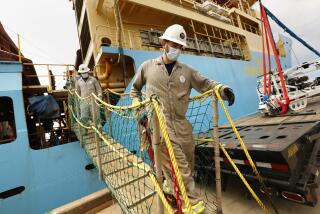Scientists Now Predict Ocean’s Bounty May Be Difficult to Reap
- Share via
SOUTH KINGSTOWN, R.I. — Scientists have sharply revised ambitious predictions of two decades ago that the oceans would provide vast new sources of food, minerals and energy, but they say the salty waters still might deliver much to mankind.
“My guess is that we are not very good at predicting,” John A. Knauss, dean of the University of Rhode Island’s oceanography graduate school, told a gathering of experts called together this month to discuss the oceans’ future.
Widely held beliefs that considerable mineral wealth could be extracted from the deep haven’t panned out, panelists agreed.
But the experts, meeting July 2, predicted that in less than four decades the oceans might be closer to being harnessed to generate electricity.
“Wave energy by 2020 will be a way to go,” said Briton John A. Gulland, a researcher at the Center for Environment Technology, Imperial College, London.
Participants stressed that a continuing concern would be striking the right balance between using and abusing ocean resources.
Industrialized countries have made progress cleaning up coastal areas and rivers, but the experts said developing nations are facing a serious pollution threat.
“If you wait until oceans get bad, it would take lifetimes to rectify,” Knauss said.
He added that it could be far safer dumping wastes, even those radioactive, in the ocean than on land where there is the risk of contaminating groundwater.
“The ocean is a great place to dispose of wastes if you do it carefully,” he said. “There is no great ocean pollution today although the public thinks there is.”
Robert L. Bendick, director of the Rhode Island Department of Environmental Management, said after the symposium that many of its speakers “appeared to minimize the impacts of pollution on the world’s oceans and to suggest that moderate levels of pollution may not be harmful.”
In Rhode Island, research has shown that pollution has had substantial adverse effects on Narragansett Bay and the state’s other coastal waterways, Bendick said.
Once-bright prospects for deep-sea mining of manganese nodules and other minerals on a profitable basis are very poor, said Willard Bascom, a researcher at the Scripps Institution of Oceanography in La Jolla, Calif., and a former executive of a sea-mining firm. He said prospecting, mining, shipping and processing costs made the minerals more expensive than obtained on land.
More to Read
Sign up for Essential California
The most important California stories and recommendations in your inbox every morning.
You may occasionally receive promotional content from the Los Angeles Times.












